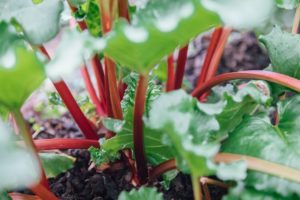
‘I know a bank where the wild thyme blows, where oxlips and the nodding violet grows, quite over-canopied with luscious woodbine, with sweet musk-roses and with eglantine,’ says Oberon, adding that it’s where Titania, the Queen of the fairies sometimes sleeps. (Mid-Summer Night’s Dream). It’s the sort of outdoors haven my friend Fiona loves: she would take a sleeping bag to such a place if she could. As it is, her back garden isn’t so much a garden as an out-door room, with a two level boarded patio, lights, tables and chairs, a barbecue and a fireplace, and she can hardly wait for the warmer weather so she can live out there most of the time.
But now I have a house where the wild rhubarb blows, thanks to a new brand of disinfectant spray discovered by chance today, making a swift dive into Lidl’s on the way home from church. Back in the day when I was growing up cleansers smelled of bleach, carbolic, coal-tar and hard, yellow soap. For a house to be clean it had to smell hard-scrubbed, not like wild rhubarb. Nowadays we don’t scrub; we buy enzyme drenched cleansers that zap grime instantly and mostly smell like lavender.
Although, if you come to my house you’ll be immersed in wild rhubarb. I’m quite taken with it.
A scent can bring back a memory very powerfully, even if long forgotten. ‘Scents bypass the thalamus and go straight to the brain’s smell centre, known as the olfactory bulb. The olfactory bulb is directly connected to the amygdala and hippocampus, which might explain why the smell of something can so immediately trigger a detailed memory or even intense emotion,’ says a science site, www.discovery.com. Smells act instantly on the emotion-handling centre of the brain and the place where memories are laid down.
Recently, new research by the University of California San Francisco showed that not being able to smell the roses may be an early indicator of dementia. They studied 1800 seniors in their seventies for a period of up to 10 years, testing their ability to identify certain smells. At the time of enrolment, all participants were dementia-free, but almost 330 — nearly 20 percent — ended up with dementia during the decade of the study.
While the team focused their research on multiple impairments, they found that a keen sense of smell was in fact linked to the group who did not develop dementia — more so than touch, hearing or vision. Participants whose smell declined by 10 percent had an almost 20 percent higher risk of getting dementia versus a range of 1 to 3 percent for declines in hearing, touch and vision.
Scientists are also studying how COVID-19 caused patients to lose their sense of smell, at least temporarily, indicating that the novel coronavirus and neurological health are closely linked.
On the basis of ‘use it or lose it’, which in this context is completely unproven, I’m going to indulge in developing my sense of smell. And wild rhubarb is a good as any a place to start!
(https://www.beingpatient.com/is-losing-your-sense-of-smell-a-sign-of-dementia-cognitive-olfactory/)














